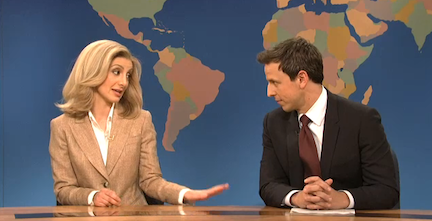In the film, “When Harry Met Sally,” 22-year-old Sally (Meg Ryan) arrives in New York to pursue the trifecta of modern-day womanhood: career, partner, and social milieu.
Several years later, Sally sobs into her pillowcase, Harry (Billy Crystal) at her side, lamenting her ex-boyfriend’s marriage to another woman. “I drove him away!” Sally wails. “And I’m going to be 40!”
“When?” Harry asks.
“Someday!” Sally howls.
Though “When Harry Met Sally” came out in 1989, Sally’s whining still resonates. In fact, according to the 2011 film “Miss Representation,” today’s TV screens and billboards mirror her anxiety: Women are stamped with an expiration date. Or as noted feminist Gloria Steinem says, with 71% of American women on TV under 30, society “limits women’s value to a baby-carrying age.”
“Miss Representation” denounces a wide range of sexist media stereotypes. Statistics on eating disorders, rape, violence, and the scarcity of women in politics show America is far from gender equality.
Consumers, not government, hold the power to influence these stereotypes, and ironically, it’s women who promote them most powerfully, deciding what to buy, watch, and endorse. So with every self-loathing glance in the mirror and every swipe of the credit card, women and girls themselves seem to uphold many of the cultural norms that limit them.
A recent showing of “Miss Representation” to a teen audience proved this point. In a theater on the campus of the Masters School, a K-12 school in Westchester County, N.Y., 150 students gathered. Murmurs filled the air when statistics hit the screen: 78 percent of teenage girls have eating disorders. Depression rates among teenage girls doubled between 2000 and 2010. In a lifetime, the average American woman spends up to $15,000 on cosmetics. In 2010, U.S. ad agencies spent $235.6 billion on marketing.
Still, many didn’t seem to see sexism as a problem.
“Teenagers generally don’t care about sexism in the media,” said junior Tim Nugmanov, from Kazakhstan. “Kids our age don’t take this stuff seriously,” said Alex George, 17, from Atlanta.
Erin White, a junior from Charlotte, N.C., doesn’t like to confront stereotypes head on. “I’m not much of a feminist,” she said. “When a guy cracks a joke about me not being in the kitchen, I don’t make a big deal of it because they know they shouldn’t have done that.”
Yet a moment later she described a classmate as “just one of those girls you can’t respect. She had an eating disorder in 8th grade, she’s always yearned to be in the popular crowd, and even though she’s one of the prettier people I know, she has to be one of the most screwed-up and insecure.”
“Women do face pressure to be something that’s impossible to be,” White acknowledged. “Guys can look however they want, hook up with whoever they want, but girls will be called sluts. I definitely think girls face more pressure than guys.”
As “Miss Representation” shows, American culture can pigeonhole and pressure women.
For example, many are afraid to identify with “feminist,” the word Steinem popularized. For some, the word conjures alarming images, like unshaven armpits and angry mobs — or one’s mother refusing to make breakfast.
But what’s even worse is the number of women who forgo breakfast — a statistic that is likely rising, since women fear becoming fat more than cancer, nuclear war, or losing their parents, according to a 2000 survey cited by psychologist Lisa Berzins in testimony before Congress.
Lena Dunham, writer, director, and star of the HBO show “Girls,” pushes back on being thin. When the media and bloggers criticized Dunham’s ample figure, Dunham replied that ”I am going to show my thighs every day till I die.”
Even so, too often women can be their own worst critics. the Jan. 26 episode of “Saturday Night Live,” Weekend Update guest Ariana Huffington (Nasim Pedrad) joked about female support for Hillary Clinton. “Hillary is hot for the first time!” Huffington said. “She’s even polling high among women. And no one hates woman more than other women. Do you know how many women other women like? Two: Oprah and who whoever Oprah likes.”
“Miss Representation” warns that women are often captives of media powers they don’t recognize. And therein lies a lesson: Before condemning the role that men play in gender inequality, let’s recognize how much females support harmful, media-created norms. Neither jewelry nor facial creams improve our health or moral character. Neither does Hillary-bashing. Supporting women in politics does.
It all boils down to personal choice. Would you like to view yourself as a decorative object or as a competent presidential candidate who understands the nuances of the abortion debate? You may be under 18, but you can vote — with your wallet. Will you give your money to corporations that create a positive-feedback loop of female insecurity and consumerism?
Meanwhile, listen inside for the women you want to be. Urban senior Kell Fahrner-Scott is.
“I don’t know how to solve the problem,” she says, “except by rejecting all the nonsense that goes on around us.”


